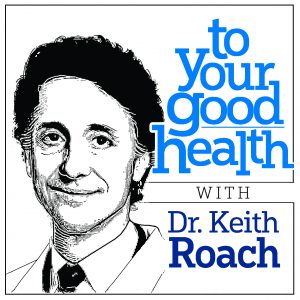TO YOUR GOOD HEALTH: Childhood vaccinations still mostly effective
By Dr. Keith Roach — February 16, 2021 DEAR DR. ROACH: I am in my mid-50s and in good health (I don’t take any medications). I rarely get sick with colds or flu. I have been vaccinated with all the common vaccinations for our childhood. With all the immigrants coming into our country, I am wondering if any have been given childhood vaccinations in their countries. I fear that chickenpox, measles, etc., could re-enter this country. If so, do our childhood vaccinations still protect us from these diseases? Should seniors be re-vaccinated or is that harmful at our age? — C.S.
DEAR DR. ROACH: I am in my mid-50s and in good health (I don’t take any medications). I rarely get sick with colds or flu. I have been vaccinated with all the common vaccinations for our childhood. With all the immigrants coming into our country, I am wondering if any have been given childhood vaccinations in their countries. I fear that chickenpox, measles, etc., could re-enter this country. If so, do our childhood vaccinations still protect us from these diseases? Should seniors be re-vaccinated or is that harmful at our age? — C.S.
ANSWER: Legal immigrants into the U.S. are required to have all vaccinations as recommended by the Advisory Committee for Immunization Practices.
Undocumented immigrants are more difficult to study, but what data there is suggests that vaccination rates are roughly the same in the countries of origin of many undocumented immigrants as in the United States. In fact, several Central American countries have higher vaccination rates than the U.S. currently.
Analysis of outbreaks of vaccine-preventable diseases have suggested that most of these outbreaks have come from visitors (Americans or foreign visitors) from countries with high levels of ongoing transmission who spread the disease to others during their infectious period. Because there are some communities where there are enough unvaccinated people due to medical reasons, personal choice or ineffective vaccination to allow spread of the disease, there continues to be ongoing infection in the U.S. This is especially true of measles.
People born before 1957 are generally considered to be immune to measles, and the vast majority have had chickenpox. People born between 1963 and 1967 (that might be you) are at risk for having had ineffective measles vaccination, and those at risk should check their immunization status and may need revaccination, especially those in an area near an outbreak.
***
DEAR DR. ROACH: I read your recent column on vaginal estrogen. Based on plants such as soy, bioidentical hormones are a safe solution for older people that provide sexual rejuvenation. You should spread the word! — P.F.
ANSWER: I appreciate your passion, but there are several problems with your statement.
First, the bioidentical female hormone in humans is estradiol, which is available only by a prescription. It remains my choice for women who need hormone replacement, such as women with severe symptoms of menopause (replacement is given by mouth or patch), or for women with atrophic vaginitis (given vaginally, by cream, tablets or ring). It is certainly the most natural option.
Second, phytoestrogens (the soy-based hormones, such as isoflavones and lignans) have chemical structures similar to estradiol, but absolutely are not bioidentical. They have both estrogen and anti-estrogen properties. They may slightly reduce breast cancer risk, probably have no effect on endometrial cancer risk and probably do not increase clotting risk. However, for women with a history of breast cancer, many oncologists recommend against soy protein due to its estrogen activity. Some hematologists warn against these in people with history of abnormal blood clots.
The effect of phytoestrogens on sexual function has been studied, and a 2018 review showed that soy “had no promising effect” on sexual function. Of course, some women will have better effects than others.
***
Dr. Roach regrets that he is unable to answer individual questions, but will incorporate them in the column whenever possible. Readers may email questions to ToYourGoodHealth@med.cornell.edu.
© 2021 North America Synd., Inc.
All Rights Reserved







